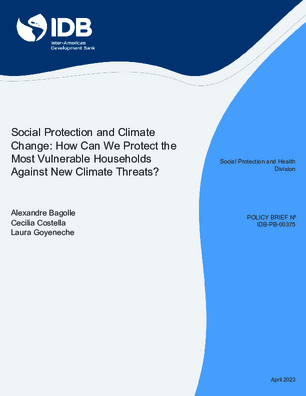Social Protection and Climate Change: How can We Protect the most Vulnerable Households Against New Climate Threats?
Date
Apr 2023
Climate change threatens the well-being of millions of people in Latin America and the Caribbean. The region is experiencing an increase in the frequency and intensity of extreme weather events and disasters, which disproportionately affect the poorest and most vulnerable groups. Moreover, the accelerated degradation of terrestrial, marine, and coastal ecosystems endangers the livelihoods of millions of people. Consequently, the implementation of mitigation policies to curb the advancement of climate change, such as the elimination of energy subsidies and the reconversion of polluting industries, can have far-reaching implications for household income and consumption levels. This paper analyzes the contributions that social protection systems can make to the climate agenda, as well as the key gaps and challenges that must be addressed to effectively respond to these emerging threats.




